Education and Community Organizing: two concepts that you will read a lot while looking through this website. But what do they mean? How do they relate to one another? Why are they important?
In short, education and community organizing are essential aspects of our democracy that allow people the agency and encouragement to achieve their goals. The two enjoy a mutualistic relationship: Community organizing promotes change by educating individuals, and educated individuals use the support of a community to share their knowledge and be bolstered in the fact that their knowledge has value. Thus, the relationship between community organizing and education is cyclical, and the two need the other to be fully actualized.
To understand community organizing, first define community. John Dewey describes that when, among individuals, “consequences are intellectually and emotionally appreciated, a shared interest is generated and the nature of the interconnected behavior is thereby transformed” (Dewey, 1927, p. 253). Here, Dewey defines how a community is built: individuals with shared interests, and stakes in a shared aspect of their lives, come together and identify with each other. This bond allows them to act collectively for the best interest of the group, a more powerful platform than would be available to a single individual. Community organizing, then, is that coalition, acting with that power, on those shared interests; it is a grassroots effort where people within a community who want to see a change assemble, listen, and problem solve.
Education, then, is learning, in whatever capacity or medium, from others. Be that listening, sharing, or challenging preconceived notions. This understanding of education is liberating: everyone is always learning from others, and everyone’s experiences are important. An example of accessible education can be found when Horton and Freire contemplate the values and principles of education in their conversation-turned-book, We Make the Road by Walking (1990). Through their conversation, you understand that education is, in all simplicity,
people learning from each other. You don’t need to know the answer. You can help people get answers. You have to know something; they have to know something. You have to respect their knowledge, which they don’t respect, and help them to respect their knowledge (Horton & Freire, 1990, p. 55).
Horton’s claim makes education incredibly accessible and relevant: education is listening and learning from any and everyone. We are all always teachers and students, meaning everyone can educate and be educated; if knowledge is power, being educated provides you with knowledge, and education is accessible to everyone, so everyone can have power.
Without education, individuals cannot accept and share their knowledge, and the potential for a community organizing effort cannot be fulfilled. Thus, the link between education and community organizing arises: recognizing the power available to individuals and communities through education (education being learning from each other) allows community organizing (a means to gain power) to take place. When part of these environments, individuals and groups prosper, support, and expand: making room for creativity, risk taking, and success.
References:
Dewey, J. (1984). The Public and its problems: An Essay in political inquiry. In Boydston, J. A. (Ed.),The Later works of John Dewey, 1925-1953: Vol. 1. 1925-1927 (pp. 240-259). [Electronic edition, 2ndrelease]. Retrieved from http://pm.nlx.com/xtf/view?docId=dewey_ii/dewey_ii.22.xml;chunk.id=div.lw.2.38;toc.depth=1;toc.id=div.lw.2.36;brand=default;query=public%20and%20its%20problems#public%20and%20its%20problems
Horton, M., & Freire, P. (1990). We make the road by walking: conversations on education and social change. (Bell, B., Gaventa, J., Peters, J., Eds.). Philadelphia, PA. Temple University Press.
